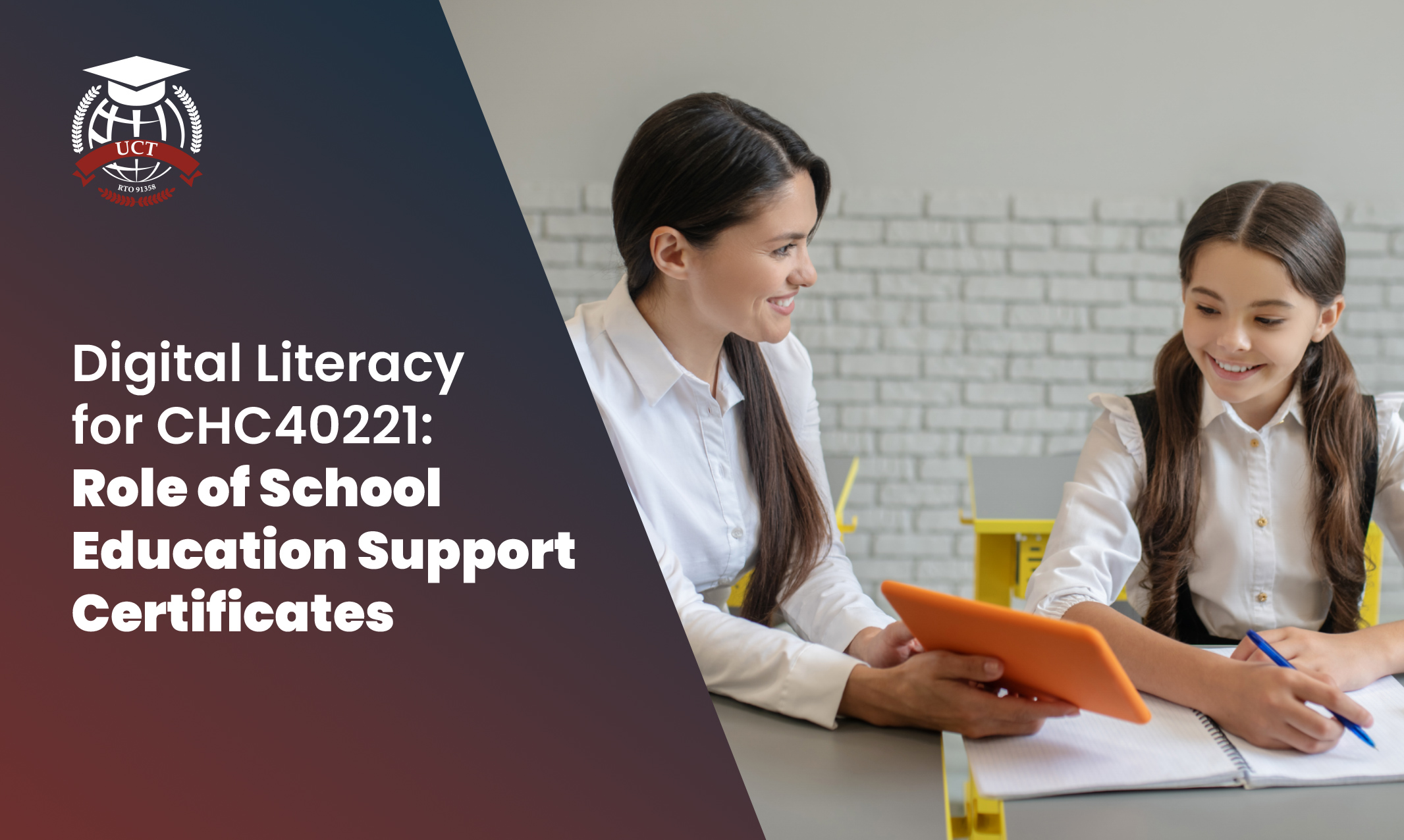Digital Literacy for CHC40221: Role of School Education Support Certificates

Enhancing School Education Support: Digital Literacy in CHC40221 Certificates
Introduction:
In the dynamic landscape of education, the role of Education Support professionals is pivotal in fostering inclusive learning environments. CHC40221 Certificate IV in School-Based Education Support equips individuals with the necessary skills to provide tailored assistance to students with diverse needs. In this comprehensive guide, we delve into the significance of Digital Literacy within the context of CHC40221, exploring its role in enhancing classroom diversity, communication, and collaboration.
Understanding Digital Literacy:
Digital Literacy encompasses the ability to navigate, evaluate, and utilize digital tools effectively. In the realm of education support, it goes beyond mere technical proficiency, encompassing critical thinking, problem-solving, and ethical use of technology. As schools increasingly integrate digital resources into their curricula, Education Support professionals must adeptly leverage these tools to support student learning.
Empowerment in Education:
Digital Literacy empowers Education Support professionals to facilitate inclusive education practices. By harnessing educational technology, they can cater to diverse learning styles and adapt instructional materials to meet individualized needs. For instance, interactive learning platforms provide opportunities for personalized feedback and differentiated instruction, ensuring that every student receives the support they require to thrive academically.
Inclusive Education and Classroom Diversity:
The principles of inclusive education underpin the ethos of CHC40221 certificates, emphasizing the importance of catering to student diversity. Digital Literacy serves as a cornerstone in this endeavor, enabling Education Support professionals to create accessible learning environments for all learners. Whether it’s through captioned videos for students with hearing impairments or text-to-speech software for those with dyslexia, digital tools play a pivotal role in fostering equitable educational opportunities.
Communication Skills and Collaboration in Education:
Effective communication lies at the heart of education support, facilitating collaboration between teachers, students, and support staff. Digital Literacy enhances communication channels, allowing for seamless interaction and information sharing. Platforms such as Learning Management Systems (LMS) enable Education Support professionals to collaborate with colleagues, access resources, and track student progress in real-time, thereby optimizing their support strategies.
Teamwork in Schools:
CHC40221 certificates emphasize the importance of teamwork in providing holistic support to students. Digital Literacy strengthens collaborative efforts within school communities, enabling Education Support professionals to work synergistically with teachers and other stakeholders. For instance, through virtual meetings and online forums, they can engage in collaborative planning, share best practices, and collectively address student needs, fostering a culture of continuous improvement.
Special Educational Needs and Individualized Support:
Digital Literacy plays a pivotal role in delivering individualized support to students with special educational needs. Education Support professionals can leverage assistive technologies to customize learning experiences, empowering students to overcome barriers and achieve their full potential. From speech-to-text software for students with communication disorders to adaptive learning platforms for those with cognitive impairments, digital tools offer tailored solutions that cater to diverse needs.
Educational Theory and Practical Application:
CHC40221 certificates bridge theoretical knowledge with practical application, preparing Education Support professionals for the complexities of real-world classroom environments. Digital Literacy enhances this integration by providing avenues for experiential learning and application of educational theory. Through simulations, online case studies, and interactive modules, individuals can develop competencies in areas such as behavior management, instructional support, and curriculum adaptation, thereby enhancing their effectiveness in supporting student learning.
Learning Strategies and Online Resources:
Digital Literacy equips Education Support professionals with an array of learning strategies and online resources to enhance their practice. From educational apps and multimedia resources to virtual manipulatives and augmented reality simulations, the digital landscape offers a plethora of tools to engage students and reinforce learning objectives. By staying abreast of emerging technologies and pedagogical trends, Education Support professionals can enrich their toolkit and deliver impactful support services.
Outdoor Education and Nature-Based Learning:
While digital tools play a significant role in modern education, outdoor education and nature-based learning remain invaluable components of CHC40221 certificates. Education Support professionals can integrate digital technologies into outdoor learning experiences, fostering connections between nature, technology, and curriculum objectives. For instance, GPS-enabled devices can facilitate geocaching activities, while wildlife identification apps enhance ecological literacy, providing immersive learning experiences that extend beyond the classroom walls.
Self-Care and Well-being in Education:
Amidst the demands of education support roles, self-care and well-being are paramount for maintaining professional efficacy and resilience. Digital Literacy offers avenues for self-care, enabling Education Support professionals to access online resources, communities, and mindfulness apps that promote mental health and work-life balance. By prioritizing their well-being, individuals can sustainably fulfill their roles and make meaningful contributions to student success.
Stress Management for Support Staff:
Supporting students with diverse needs can be rewarding yet challenging, often leading to stress and burnout among education support staff. Digital Literacy equips individuals with stress management tools and coping strategies to navigate these pressures effectively. Whether it’s through relaxation apps, online support groups, or mindfulness exercises, technology can empower Education Support professionals to mitigate stressors, foster resilience, and maintain a healthy work-life balance.
In conclusion:
the integration of Digital Literacy within CHC40221 Certificate IV in School-Based Education Support heralds a new era of empowerment, innovation, and inclusivity in the realm of education support. Throughout this exploration, we’ve illuminated the transformative role that Digital Literacy plays in equipping Education Support professionals with the tools and strategies necessary to meet the diverse needs of students in today’s classrooms. By harnessing digital technologies, Education Support professionals can create accessible, personalized learning experiences that cater to individual learning styles and abilities. From adaptive learning platforms to assistive technologies, the digital landscape offers a myriad of resources to enhance student engagement, facilitate collaboration, and foster academic success.
Moreover, Digital Literacy fosters collaboration and communication among stakeholders, promoting a culture of teamwork and collective responsibility for student achievement. Through platforms such as Learning Management Systems and virtual meeting spaces, Education Support professionals can collaborate with teachers, administrators, and parents to develop comprehensive support plans and address student needs holistically. Furthermore, the integration of Digital Literacy extends beyond the confines of the classroom, encompassing outdoor education, nature-based learning, and self-care practices. By leveraging digital tools in outdoor learning experiences, Education Support professionals can create immersive, interdisciplinary opportunities that connect students with their natural environment and foster environmental stewardship.
Additionally, Digital Literacy empowers Education Support professionals to prioritize their own well-being through access to online resources, communities, and stress management tools. By embracing self-care practices and cultivating resilience, individuals can sustainably fulfill their roles and make meaningful contributions to student success.
As we look to the future, the importance of Digital Literacy in education support cannot be overstated. As technology continues to evolve, Education Support professionals must remain agile and adaptable, continuously updating their skills and knowledge to meet the evolving needs of students and communities. By embracing Digital Literacy as a cornerstone of professional practice, we can pave the way for a more inclusive, equitable, and innovative educational landscape.

